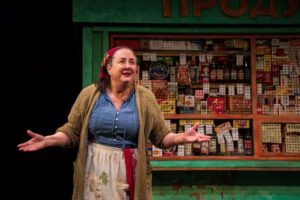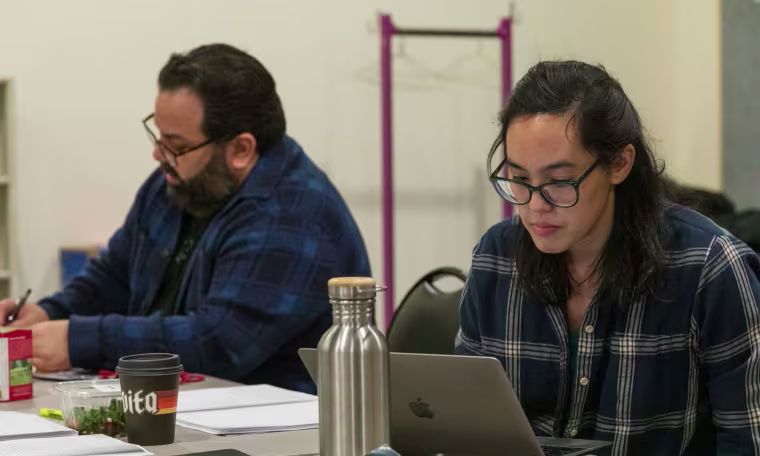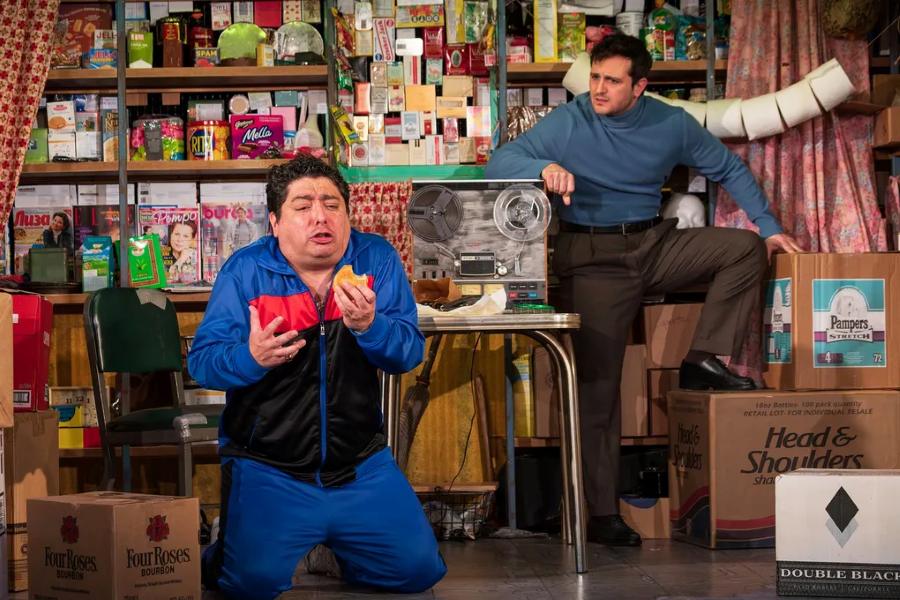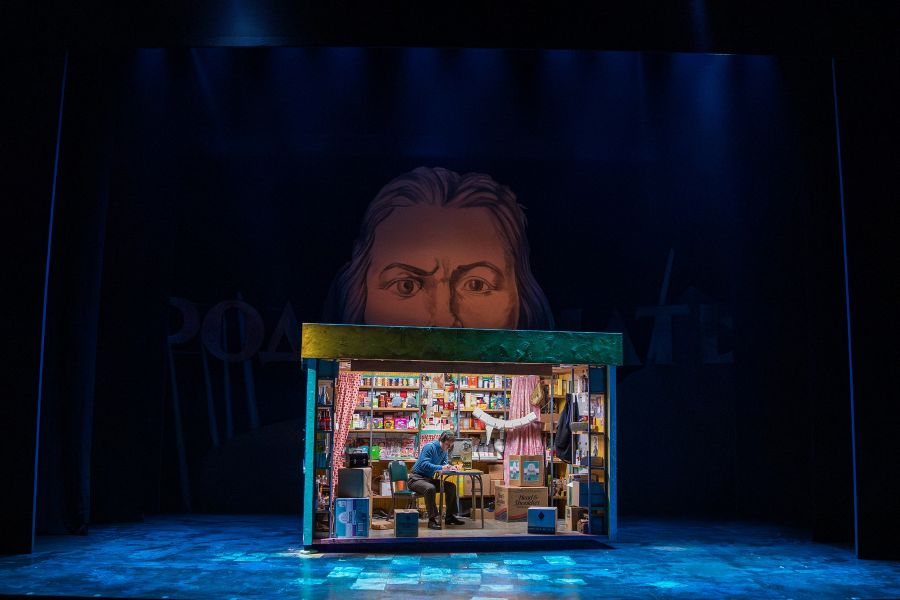Lauren Yee’s new play Mother Russia almost made it to the stage motherless. After a fall 2024 workshop at Seattle Rep, Yee decided to cut the play’s cast of four down to three, excising the narrator figure who had been there since the play’s early development. With all the main action happening between the other three characters, she wasn’t sure if Mother Russia herself still fit.
Then, with just weeks before the play’s world premiere at Seattle Rep on March 12, the New York-based Yee began to have second thoughts.
“I got to the first day of rehearsal, and I was like, ‘This is a mistake,’” Yee recalled. “I tried pulling her from the play, and the play kind of collapsed aesthetically.”
Mother Russia, like Yee’s frequently produced Cambodian Rock Band and The Great Leap, is another piece of historical fiction that finds its characters at points of major social and political upheaval. Set in St. Petersburg in the 1990s, shortly after the collapse of the Soviet Union, it anatomizes the growing pains of a society newly exposed to the free market from the vantage point of two bumbling 20-somethings, Evgeny and Dmitri, who have traded in former hopes for government sinecures for small-business entrepreneurship.
Like Yee’s other historical plays, the implications are wider than just one time and place.

“Though the play is set in 1992 in St. Petersburg, I wrote this play as a meditation on capitalism, on moments of great societal change, of existential crisis,” Yee said. “I don’t think that’s limited to Russia in the ’90s.” Indeed, Yee said, for her the play was “a means of understanding post-recession America. There are people who are like, ‘I feel like I’m a winner.’ And there are people who are like, ‘I feel like I lost everything.’”
Once again, Yee juxtaposes communism and pop culture to illustrate the friction between hope and danger that can arise during moments of sudden change.
This time, the whiplash was happening offstage as well. A few weeks before rehearsals were set to begin for the Rep production, original director Joshua Kahan Brody had to bow out due to family obligations. Yee reached out to Nicholas C. Avila, who had directed a 2018 workshop at the Chautauqua Theater Company, to see if he would be willing to come on board. Avila said yes. But the uncertainty of walking into a production he hadn’t cast or had any input on was compounded by another curveball: He discovered that Yee had cut Mother Russia from the script.
“I was surprised, because I thought she contextualizes the piece,” Avila said. “It feels like Mother Russia, the character, is telling you you’re not sitting in a realistic time capsule that is meant to be an accurate historical representation of the period. It is theatrical and it is absurd.”
So, after a few days of rehearsals in which Yee pondered the play’s structure—essentially, a mini-workshop in itself, Avila noted—the playwright decided that Mother Russia needed to return. When Yee and Avila proposed the idea to Seattle Rep artistic director Dámaso Rodriguez, he said yes “without blinking an eye,” Avila recalled. And Julie Briskman, the actor originally cast in the role, whose contract had been canceled, was ready and willing to rejoin the fold.
“[Yee] followed a gut feeling to cut it, but then to have the courage to come back and say, ‘Maybe I was wrong on that’—it’s not something I find to be common,” Avila said. “The world got flipped upside down for everybody. And I felt a little more at home, because now everybody’s turned upside down.”

Fits and starts have been the norm for Yee’s play, which has taken steps forward and backward since development began in 2017 at the Colorado New Play Festival. Invited there by Seattle Rep, Yee initially brought some pages about the Soviet Union and Eastern Europe that she thought of as rather serious. Over that week of development, though, the shape of the more comic Mother Russia began to emerge.
“It was this whirlwind of energy that I think lent itself to the madcap quality of the play,” Yee said.
She spent the next several years finishing Mother Russia and was set to premiere it at La Jolla Playhouse in 2020. A pandemic postponement moved it to 2022. Then Russia invaded Ukraine, and the company pulled its production, citing a need for “additional time for reconsideration of certain script and production elements.”
Yee continued working on the play. Her interest in examining complex historical systems of power and their implications on our current world never wavered.
“There’s something scary but also something really exciting to be able to reflect on world history and know that the seeds of what’s discussed there can help us to understand what’s going on today,” she said. “I love writing history pieces as a way of holding up a mirror to today’s geopolitical situation.”
Despite its period-piece trappings, Mother Russia also exists outside of time because of Mother Russia, an observer who directly addresses the audience but doesn’t interact with the other characters or the play’s narrative engine. In Seattle Rep’s production, a babushka-clad Briskman tiptoes between rueful and wistful, charmingly plying front-row audience members with a box of donuts and waxing philosophical about the many changes she’s witnessed. Also the things that have stayed the same: “I have been disappointed by so many men,” she sighs.
Within the confines of the play’s primary narrative, Dmitri (Jesse Calixto in the Rep’s production) supplements his struggling corner-store business with a surveillance operation, but he’s about as competent at subterfuge as he is at attracting buyers for his assortment of consumer goods: cans of Spam, glossy magazines, condoms. He enlists high school buddy Evgeny (Billy Finn), whose father was a high-ranking KGB official, to help him on the surveillance side, and together they take shifts tracking their target, a former pop singer and political dissident named Katya (Andi Alhadeff). Once a celebrity in Russia, her star dimmed when Western music became available and she was suddenly competing with Whitney Houston.
Dmitri’s unmodulated exuberance and Evgeny’s nervous timidity make for classic odd-couple shenanigans as they try to cobble together an effective wiretap strategy. But both are equally adrift on the waves of change. Dmitri is baffled by Folgers advertisements he keeps seeing everywhere, while Evgeny has no idea how to live up to his father’s expectations now that a predetermined path has been replaced with the freedom to choose. Neither knows what to make of the new McDonald’s around the block—until they order a Filet-O-Fish, and are sensorily overwhelmed: “Is this what capitalism tastes like?!”

Following closely on Seattle Rep’s world premiere production are two more stagings of Mother Russia: one at Penobscot Theatre Company (PTC) in Bangor, Maine (May 1-18), and one at Profile Theatre in Portland, Oregon (June 5-22). (The play was also just announced as part of the next season at New York City’s Signature Theatre.)
“I fell for it sort of immediately,” said Jonathan Berry, departing artistic director of PTC and director of the company’s production. “It was smart, incredibly funny, and having a really great conversation about how people respond suddenly to this explosion of freedom and what that does to relationships. We can appreciate and love the humor in their overblown senses of suddenly landing in like a Technicolor world. When there’s a threat of that being removed, we understand this person is going to do anything he has to to hold on to what he achieved. That is where that humor is going to come from, and it’s also where that tragedy is going to come from.”
Indeed, as in Yee’s other history plays, comedy and tragedy often sit side by side in Mother Russia. “My writing frequently will find lightness and absurdity in very dark places, because that’s so true to the lives that we live,” Yee explained.
Still, there’s a distinct difference in tone this time around, said Josh Hecht, artistic director of Profile Theatre, who’s directing its production. “A lot of her plays are quite funny and have a lot of whimsy in them,” Hecht said. “But this one feels like it has more capital-J jokes, and has a farce-ness to it—almost slapstick—that feels stylistically different.”
Profile nearly premiered Mother Russia several years ago. This season, Yee has been its featured playwright, with readings and several mainstage productions of her other work; Mother Russia is the season’s culmination. Hecht said he has watched Yee hone the play’s themes over years of rewriting.
“She’s really teased out what I think is in our own American cultural psyche around late-stage capitalism—the concentration of power in the hands of billionaires, and how that impacts the entire culture in a way that feels really fresh, really urgent,” Hecht said.
For Yee, the long gestation of Mother Russia began with a burst of inspiration and excitement before lapsing into a period she calls the “valley of despair” when the play just wasn’t quite coming together. Coming out on the other side, with the play’s shape and structure now clear, was a gratifying experience.
“Writing a play is so hard that it’s hard to mastermind it,” she said. “You kind of have to write whatever comes out.” A play, she said, is like a child, and like Mother Russia herself, Yee takes a philosophical stance toward her offspring. “It comes out and you look at it and you’re like, ‘OK, who are you? What are you interested in? How can I support you?’ You can’t make them be anything other than what they want to be, for better or worse.”
Dusty Somers (he/him) is a Seattle-based journalist who’s written about theatre and performance for The Seattle Times and City Arts magazine.
Support American Theatre: a just and thriving theatre ecology begins with information for all. Please join us in this mission by joining TCG, which entitles you to copies of our quarterly print magazine and helps support a long legacy of quality nonprofit arts journalism.
Related

Holding the Mirror Up to Russia
A spate of new productions and adaptations explore the geopolitical and theatrical legacies of an empire in decline.
In "Critic's Notebook"

Lauren Yee Receives $25,000 Kesselring Prize
The prize honors emerging writers with support toward development of their work.
In "Awards"

Jackie Sibblies Drury and Lauren Yee Win 2019 Steinberg Playwright Awards
The playwrights will each receive a $50,000 cash prize.
In "Awards"


